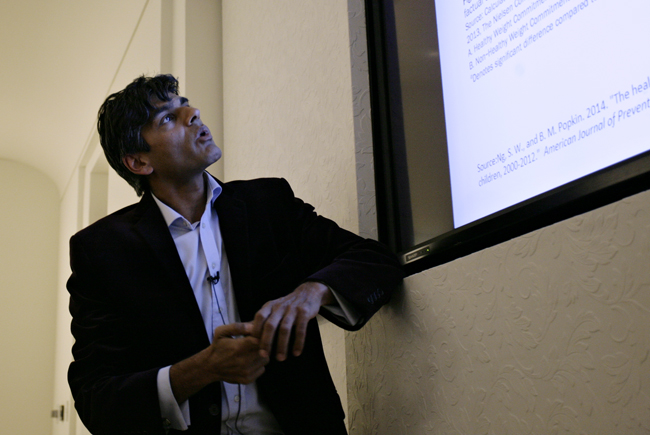Raj Patel, research professor in the LBJ School of Public Affairs, advocated for more community-based alternatives to end hunger and malnutrition in Africa during a talk at Townes Hall on Monday.
The lecture was the last event in the Rapoport Center for Human Rights and Justice’s Health & Human Rights Colloquium series.
According to Patel, during a summit in 2013, the G-8 countries launched the “New Alliance of Food Security and Nutrition in Africa,” setting a goal to lift 50 million people from poverty by 2022.
“It was launched in the United States as a public-private partnership under the Obama administration,” Patel said. “What they said was, ‘We are never going to end hunger in Africa without private investment.’ There are things that only companies can do — like building silos for storage and developing seeds and fertilizers. What’s interesting about that is it’s wrong.”
The New Alliance model is too reliant on the private sector to be in the best interest of Africa, according to Patel.
“It’s hard for anyone to think of doing things without the private sector,” Patel said.
Instead, Patel argued a community-based alternative model in Africa could improve the crops grown and stop hunger.
“They intercrop: Farmers themselves become scientists, and there’s peer-to-peer networking of farming and agriculture research,” Patel said. “In doing that, they have these farmer-scientist days where they work on their crops.”
According to Patel, there was still a high infant malnutrition rate in Africa, which he believes is linked to gender inequality.
“Harvesting is women’s work,” Patel said. “So is carrying water, catching firewood, cooking, breast-feeding. So the fathers themselves come up with a Food Network-style recipe days. These moments become spaces where there is equality.”
Daniel Brinks, co-director of the Rapoport Center, said Patel’s method may be difficult to expand beyond smaller communities.
“It’s a challenge for us to think differently about how we address food insecurities,” Brinks said. “To move away from philanthropy and top-down effort and promote more bottom-up community efforts.”
International nutrition senior Maddy Bennett said she’s followed Patel’s work and found his presentation informative.
“[Patel] is very charismatic,” Bennett said. “I’ve read two of his books, and it changed my mind about what I want to do with my life.”





















